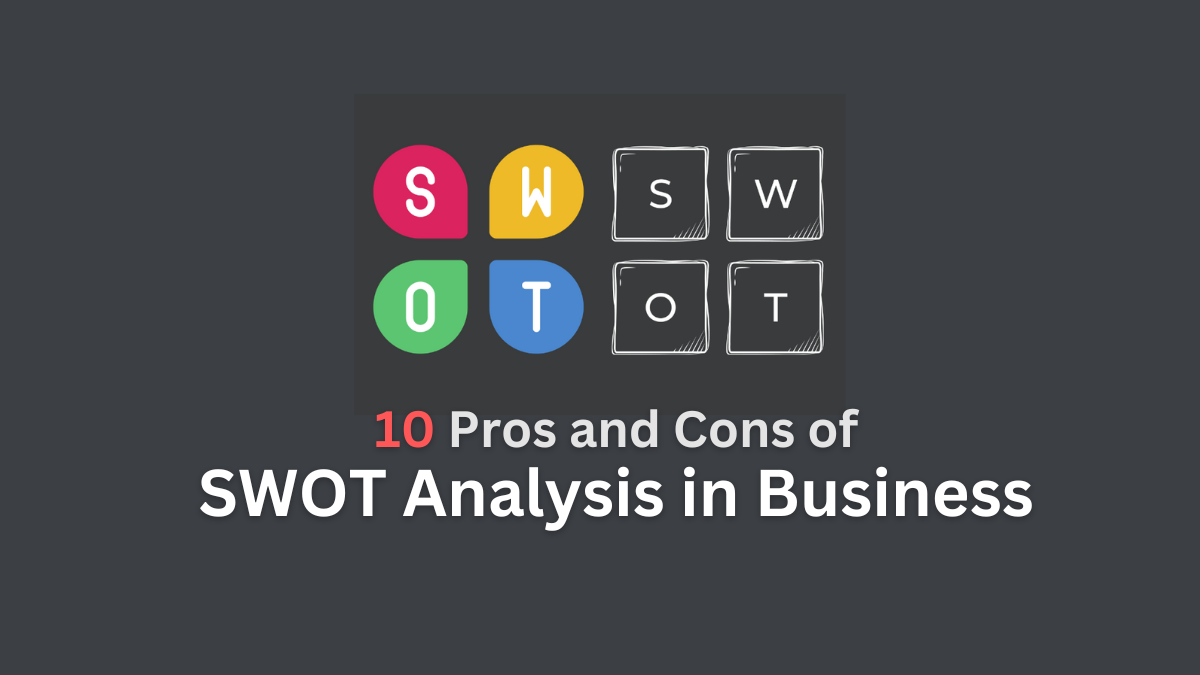Pros and Cons of SWOT Analysis
SWOT Analysis, which stands for strengths, weaknesses, opportunities, and threats is a strategic planning tool used to evaluate an organization’s internal strengths and weaknesses, as well as external opportunities and threats.
Here we will explore the 10 major pros and cons of SWOT analysis in business, so let’s get started:
Pros of SWOT Analysis in Business
The following are the five main benefits of SWOT analysis in business:
Comprehensive Overview
SWOT Analysis offers a structured approach to understanding a company’s current position by clearly identifying its internal strengths and weaknesses, as well as external opportunities and threats. This comprehensive snapshot helps in assessing overall organizational health and formulating strategic plans.
By consolidating critical information in one place, businesses can make informed decisions, ensuring that all aspects of the company are considered during strategic planning.
Prioritization of Strategic Initiatives
Through SWOT Analysis, businesses can prioritize their focus areas by identifying the most critical strengths to leverage and weaknesses to address. Similarly, they can spot the most promising opportunities and most threatening external factors.
This prioritization helps allocate resources more effectively, ensuring that the company addresses the most impactful areas first, leading to more efficient and strategic use of time and resources.
Versatility and Applicability
SWOT Analysis can be used across various industries and for different purposes, such as evaluating overall business performance, planning new projects, developing marketing strategies, or exploring new market opportunities.
This versatility makes it a valuable tool for companies of all sizes and industries, providing insights that are tailored to specific organizational needs and contexts.
Enhanced Strategic Planning
The process of conducting a SWOT Analysis forces businesses to step back from daily operations and engage in strategic thinking. It encourages leaders to consider long-term goals and the broader business environment.
This strategic planning helps businesses remain competitive, adaptable, and proactive in responding to market changes and external threats, leading to sustained growth and innovation.
Read More: 10 Major Pros and Cons of Diversity in the Organization
Facilitation of Team Collaboration
SWOT Analysis is typically conducted in group settings, involving various stakeholders from different departments. This collaborative approach ensures diverse perspectives and ideas are considered.
Team collaboration enhances the quality of the analysis by incorporating different viewpoints, leading to more comprehensive and innovative solutions.
Cons of SWOT Analysis in Business
The SWOT analysis, with numerous benefits, also has its drawbacks. The following are five main drawbacks of SWOT analysis in business:
Time-Consuming and Resource-Intensive
Conducting a thorough SWOT Analysis requires significant data collection and analysis, which can be time-consuming and resource-intensive. For companies with limited resources or tight timelines, this process can be burdensome, potentially diverting attention and resources from other critical activities.
Read More: 10 Major Pros and Cons of Business Ethics in Business
Risk of Narrow Internal Focus
SWOT Analysis often emphasizes internal factors, potentially leading to a narrow perspective that overlooks important external elements such as market trends, regulatory changes, and competitive dynamics.
This narrow focus can result in missed opportunities or threats that could significantly impact the company, leading to strategic blind spots.
Potential for Groupthink
Since SWOT Analysis is usually conducted in group settings, there is a risk of groupthink, where individuals conform to the dominant opinions rather than presenting unique perspectives. Groupthink can stifle creativity and innovation, leading to less effective strategic decisions and a lack of diverse ideas.
Read More: 10 Major Pros and Cons of Participative Management
Subjectivity and Bias
The quality of a SWOT Analysis depends on the input of those conducting it, which can be influenced by personal biases and subjective views. This subjectivity can result in an inaccurate or unbalanced analysis, potentially leading to misguided strategic decisions that do not reflect the true state of the business.
Lack of Prioritization
SWOT Analysis identifies numerous factors but does not inherently provide a method for prioritizing them. This can lead to confusion about which areas to address first. Without clear prioritization, businesses may struggle to focus on the most critical issues, spreading resources too thinly and failing to achieve significant improvements in key areas.
While SWOT Analysis is a powerful tool that provides a comprehensive overview of a company’s strategic position, its effectiveness can be limited by certain drawbacks. Hence, the above-mentioned are the 10 major pros and cons of SWOT Analysis in business.
